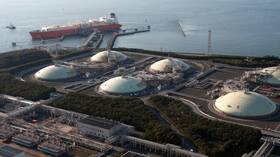In an effort to replace the vacuum left by the disruption of Russia’s natural gas supply, Germany has expedited the building of the nation’s first terminal to receive LNG imports.
The LNG terminals at Wilhelmshaven’s port will be able to supply the equivalent of 20% of the natural gas that was previously imported from Russia starting this winter.
After the Nord Stream (North Stream) pipelines, which were last week moving massive amounts of hydrocarbons across the Baltic Sea to Europe, were broken in what a Danish-Swedish assessment called as a “deliberate act of sabotage,” Moscow halted gas deliveries to Germany.
The German government has invested billions of euros on 5 projects, including the Wilhelmshaven port project, which should be able to handle about 25 billion cubic metres of gas per year, or roughly half the capacity of the Nord Stream 1 pipeline, in order to find alternative supplies.
Natural gas that has been chilled and transformed into a liquid at the LNG terminals can be imported by sea transport.
The facility known as the FSRU, which can store fuel and convert LNG back into ready-to-use gas, is being finished by attaching a specialist vessel to the Wilhelmshaven platform.
Germany, unlike other nations in Europe, lacks an LNG terminal and is dependent on comparatively affordable pipeline imports from Russia.
Nevertheless, Germany has started to wean itself off of Moscow’s gas exports, which formerly made up 55% of its supply, since the beginning of the Russian military incursion in Ukraine.
Berlin extensively invested in liquefied natural gas to fill the void created by Russian imports. Berlin diversified its sources and ensured sufficient fuel supply to keep its factories operating.
Chancellor Olaf Scholz inked a contract last week to export liquefied natural gas to the United Arab Emirates while touring the Gulf nations in search of fresh sources.
Germany established a rule to greatly speed up the approval procedure for LNG terminals, and five FSRU ships were contracted to connect to the new terminals.
The project in Wilhelmshaven is moving along quickly. According to Holger Kretz, project manager for German energy giant Uniper, the facility should be finished this winter.
Kretz continues, “Usually a project like this takes five to six years.
The activities will “irreversibly degrade fragile habitats, as well as endanger the living spaces of endangered porpoises,” according to German environmental organisation DUH.
Author: AFP.
The German government is rushing to find an alternative to Russian gas while spending billions of dollars.

